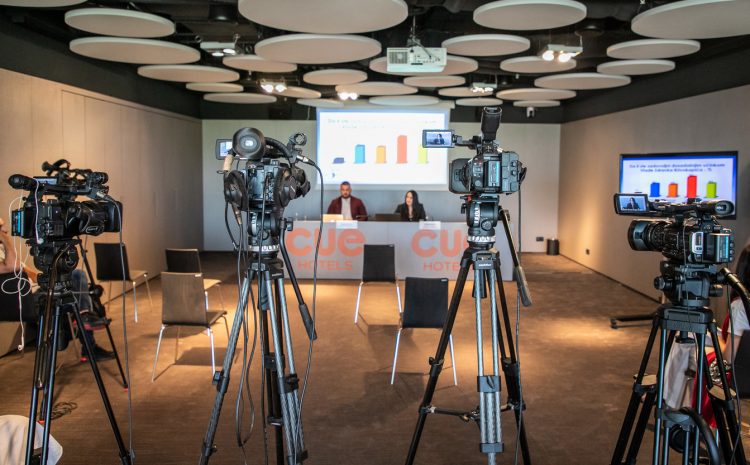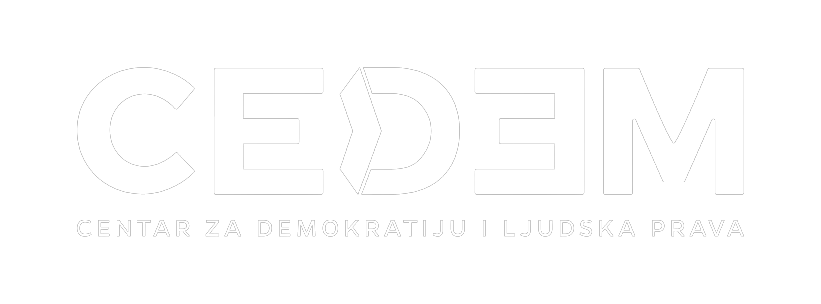
Every second citizen is dissatisfied with the work of the Government, and the majority of respondents think that early parliamentary elections should be called ahead of time
Every second citizen is dissatisfied with the work of the Government, and the majority of respondents think that early parliamentary elections should be called ahead of time
Podgorica, PR press service – Every second citizen is dissatisfied with the work of the Government, more than two thirds of the citizens support the membership of Montenegro in the EU while 42.5 percent think that parliamentary elections should be held ahead of time.
This was announced at the press conference held by the Center for Democracy and Human Rights (CEDEM) on the occasion of presentation of the first comprehensive bi-yearly survey of political public opinion in Montenegro in 2021, which you can download here.
The director of CEDEM, Milena Bešić, stated that 41.1 percent of the respondents answered that they think that Montenegro is going the wrong way.
“It is indicative that since 2009, the number of those who believe that Montenegro is moving in the wrong direction has increased by 20 percent. There is a larger number of those who are dissatisfied with the performance of the Government of Zdravko Krivokapić – every other citizen, while only 5.2 percent of those surveyed said that they were very satisfied,” said Bešić.
She explained that according to the measurement criteria, the state of trust in institutions that exceeds 40 percent is satisfactory, and that only three institutions exceed that percentage. However, she emphasized that these are the institutions with which citizens have a direct and personal relationship with.
“The trend of declining trust in institutions continues, regardless of the change of government, and there is a particularly drastic drop in trust in political institutions, which indicates that these institutions must make additional efforts to restore the trust of citizens,” Bešić said.
If parliamentary elections were to be held next week, percentages of citizens that have already decided who they would vote for would vote for are as follows: 31 percent for the Democratic Party of Socialists (DPS), 18.7 percent for Democratic Front (DF), 18.4 percent for Democrats, 6.4 percent for URA, 4.4 percent for Bosniak Party, 3.5 percent for SNP, 3.5 percent for Social Democrats (SD), 3 percent for SDP, while other parties are around or below the threshold.
“DPS is still the single strongest political party. However, DPS does not have the capacity to form a majority with traditional partners. Without one of the key actors such as DPS, DF or the Democrats, no other combination of government is possible, and in order to maintain the current government, the parliamentary majority must find a compromise,” Bešić said.
If Prime Minister Zdravko Krivokapić formed his own party, at least 4.9 percent of citizens said they would definitely or probably vote for that party, which would be enough to secure parliamentary status.
When asked whether it is necessary to call early parliamentary elections, 30.5 percent of respondents think that early parliamentary elections should be called as soon as possible, while 12 percent think that they should be called on the same day as the next presidential elections.
“Among those who think that they should be called as soon as possible are mostly supporters of the former government, i.e. the current opposition, while on the other hand those who think that early parliamentary elections should not be called are mostly respondents who support the current government,” Bešić explained.
If the presidential elections were held tomorrow, as Bešić said, 41.5 percent of citizens would vote for Milo Đukanović, 19.4 percent for Aleksa Bečić, 11.5 percent for Andrija Mandić, 9.6 for Zdravko Krivokapić, and 7.3 percent for Dritan Abazović.
“We can conclude that a single unique candidate from the current government would have an advantage over Đukanović,” Bešić said.
CEDEM Program Manager Marko Pejović said that more than two thirds of Montenegrin citizens support Montenegro’s membership in the European Union, and that 45 percent of citizens believe that Montenegro should remain a member of NATO.
“The largest number of citizens, over 40 percent of them, believe that Montenegro should rely on the EU in foreign policy,” Pejović said.
He stated that 56.6 percent of citizens believe that the influence of Serbia is stronger or the same as it was before the change of government, while at the same time every other citizen thinks that the influence of the Serbian Orthodox Church is stronger or too grand on Government of Montenegro than it was before the change of government.
“More than a quarter of citizens believe that it is necessary to publicly publish the content of the so-called Baseline agreement (Temeljni ugovor) and only then discuss whether or not it should be signed, and the same number believes that it should be signed in Montenegro, while every fifth believes that Montenegro should not sign this agreement. “, said Pejović.
When it comes to the issue of the census, over 50 percent believe that the census should be held regularly this year. Every fourth citizen thinks that the census should be postponed, because the political circumstances are such that they can influence the result of the census, while 22 percent of citizens do not have an opinion on the issue. According to Pejović, 45% of citizens would declare themselves as Montenegrins on the census, while 30% would declare themselves as Serbs, 5.7 percent of respondents would declare as Bosniaks, 4.3 percent as Muslims, 3.8 percent as Albanians, while the percentage of other nationalities would be less than 1 percent.
“What is certain is that changes in the national structure of the population in the upcoming census cannot be expected,” Pejović explained.
Over 70 percent of citizens believe that Montenegro is an independent state and there is no need to reconsider the issue of Montenegrin independence.
Considering the frequent public discussions regarding the activities on finding oil and gas, Pejović pointed out that about 53 percent of the citizens think that the Government should work on these activities, while 26.7 percent are against. In the end, “over 40% of citizens believe that the Government and the competent institutions are very well and mostly well suppressing the coronary virus pandemic,” concluded Pejović.
The research was conducted from June 18 to 26 of the current year on a sample of 1,015 respondents.


